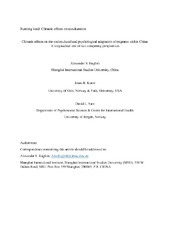Climatic effects on the sociocultural and psychological adaptation of migrants within China: A longitudinal test of two competing perspectives
Peer reviewed, Journal article
Accepted version
Permanent lenke
https://hdl.handle.net/1956/22670Utgivelsesdato
2019Metadata
Vis full innførselSamlinger
Originalversjon
https://doi.org/10.1111/ajsp.12363Sammendrag
Little is known about how climatic differences may psychologically impact individuals who migrate from one geographical area to another. A climatic demand theory perspective suggests that migration from more demanding climatic areas to less demanding climatic areas would lead to better psychological outcomes while predicting the opposite for migration from less demanding to more demanding climates. In contrast, a climatic‐fit perspective would predict that moving to areas that climatically are similar to one's home would lead to the best psychological outcomes whereas any major deviation would lead to worse outcomes. To test these competing perspectives, a longitudinal, multisite study was conducted with over 1,000 student migrants who moved from various areas in China to 12 cities. Participants’ life satisfaction and perceived stress were assessed upon arrival and at the end of the semester together with their sociocultural adaptation. Supporting the climatic‐fit perspective, multilevel analyses showed that participants reported the least stress and highest sociocultural adaptation when they migrated to host sites that were climatically similar to their homes. Conversely, individuals who migrated from very demanding to less demanding climatic regions and vice versa reported an increase in stress and lower sociocultural adaptation.
